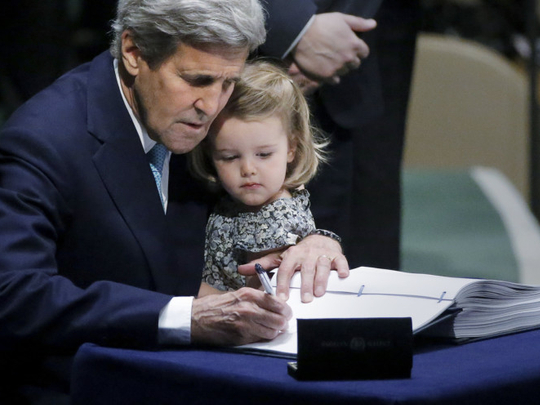
‘Representatives from more than 160 nations gathered at the United Nations to sign the accord they hammered out in Paris last December to reduce greenhouse gas emissions and slow the effects of climate change,” said the Los Angeles Times in an editorial. “But is it too little, too late? The accord was an extraordinary achievement, but in the end, it was only a nonbinding agreement, and everyone understood that the real, daunting challenge would be in working together to meet the accord’s stated goals,” the paper questioned.
Commenting on the issue in the context of the United States presidential campaign, the paper said: “Despite the urgency of the issue, discussion of climate change has been depressingly limited in the presidential campaign. Whoever wins the White House needs to recognize the enormity and gravity of the problem, and lead the way to a more habitable world.”
The USA Today echoed the concerns and said: “The Paris climate accord represents the most ambitious international effort to date to head off catastrophic warming. But even if all countries keep to their emission-reduction promises, the pledges made aren’t nearly enough to meet the Paris target.”
The Toronto Star examined the issue from a Canadian perspective and said: “Our over-heated planet keeps getting warmer and we already see the results ... Canada’s record is especially woeful in this regard. The time for action is now. But Prime Minister Justin Trudeau and the country’s premiers have not acted with sufficient urgency. Creating a national plan on carbon pricing was punted into 2017, and it may not happen even then.”
The Guardian adopted the view that the historic agreement must be worked upon with the seriousness it deserves. “The danger of gala events like the official signing of the climate change treaty in New York, crowned with a guest appearance from Leonardo DiCaprio and with 60 heads of state in attendance, is the impression they create that the job is done. It was certainly a spectacular demonstration of global intent to get more than 170 signatures on the deal agreed, but what matters is making it legally binding. For that, it must be not just signed but ratified by at least 55 countries, and it must cover 55 per cent of emissions. Nor does the Paris deal go far enough. It was only a step on a long, hard road,” the paper said in an editorial.
The Irish Times reminded its readers of the responsibility for all nations, including Ireland, that comes with the climate pact. “The United States, China, India, Canada, Mexico and South Africa are expected to formally approve the agreement later this year, but the EU may take longer … Playing our part in tackling climate change is not high on the agenda of talks between Fine Gael, Fianna Fail and others about forming a government. But it should be. ”
In Bangladesh, the Dhaka Tribune noted that the agreement was “a sign of support for climate-vulnerable countries such as Bangladesh, where even a one-metre rise in sea level could displace millions of people and inundate half of our rice farming land”. It also pointed out that while globally, greenhouse emissions from Bangladesh were negligible, “it is important we try to do so sustainably to prevent the negative consequences of climate change ...”





_resources1_16a31069e4e_small.jpg)





